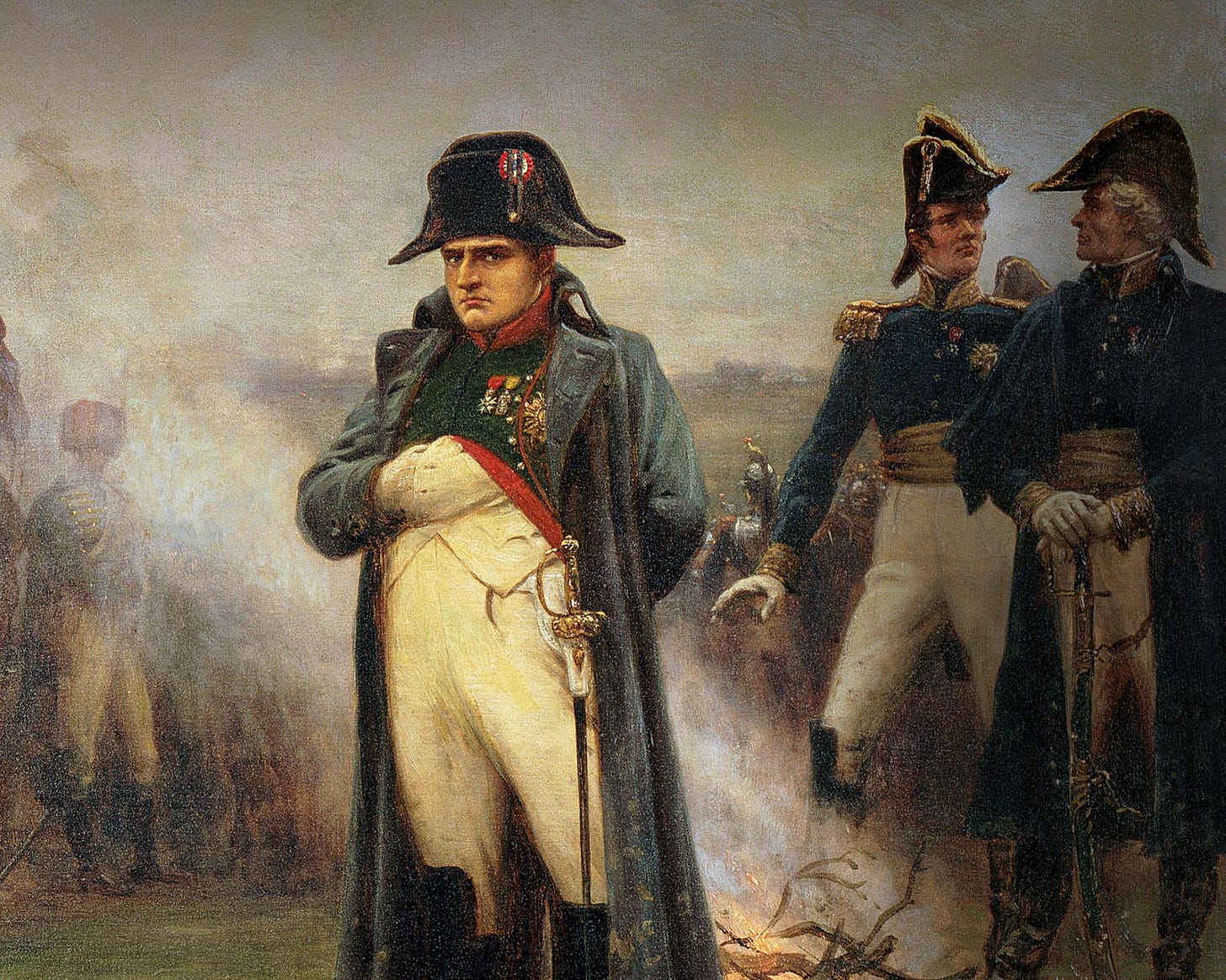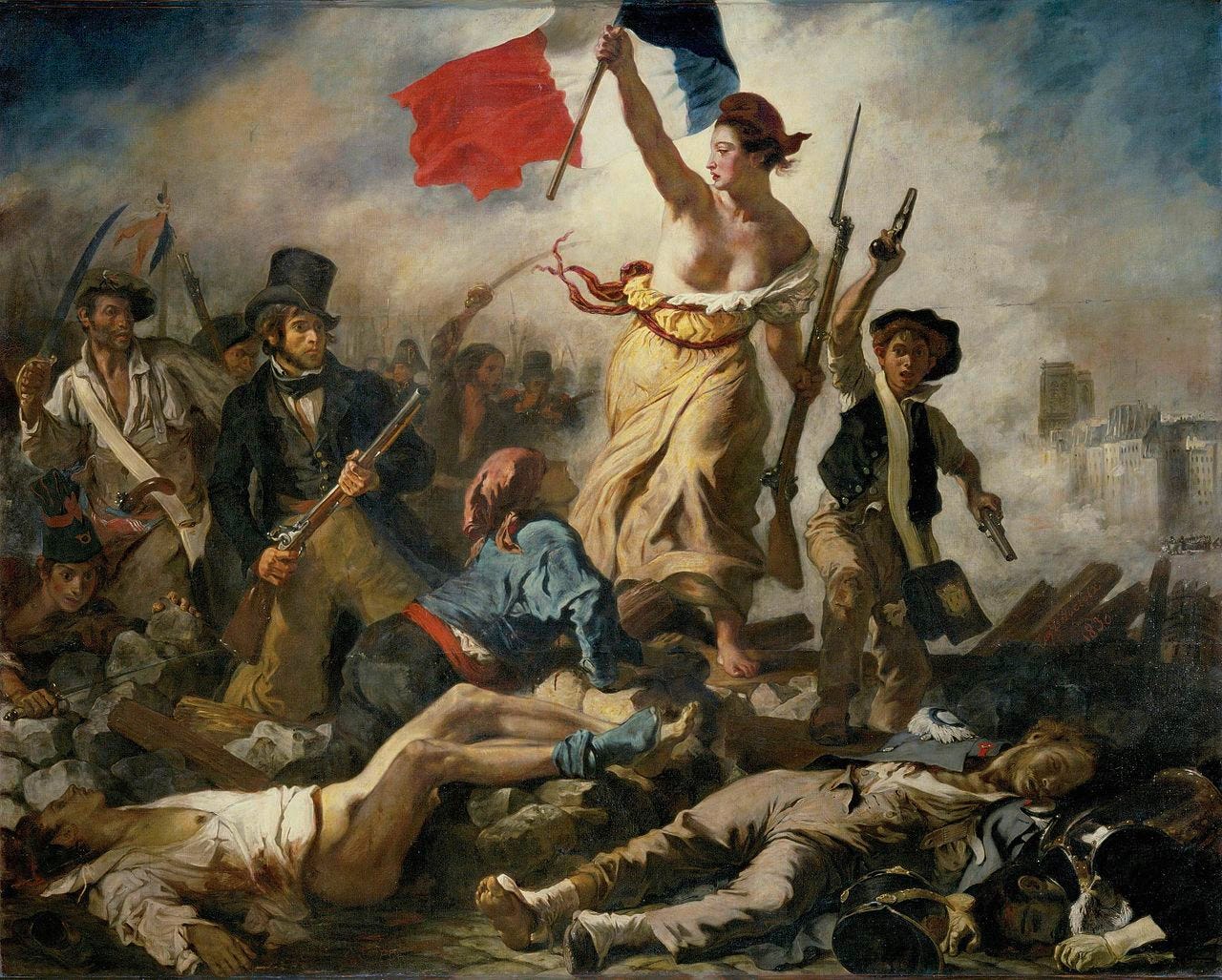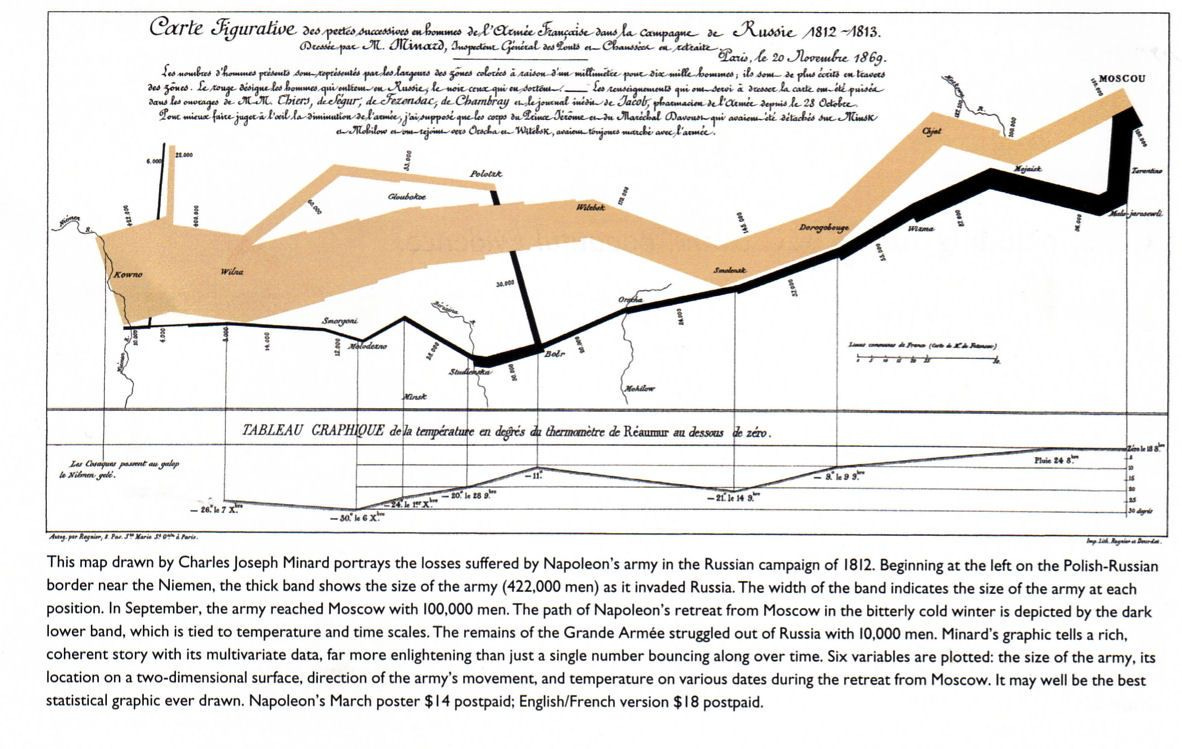🇫🇷 Napoleon's Secret Weapon
Napoleon had a secret weapon, something no other European leader had access to.

Napoleon Bonaparte is one of history's greatest conquerors. His sudden rise and methodical subjugation of Europe are legendary. Napoleon's battles and strategies are still taught in military academies today.
Like Caesar, Alexander and Genghis Khan before him, Napoleon had a keen eye for military strategy and tactics. But unlike them, Napoleon wasn't winning his conquests against a distant foe he outmatched militarily. He fought against first-rate world powers - Britain, Prussia, Austria, Italy, and Russia - all of whom had similar weapon systems and strong, centrally managed societies.
What allowed Napoleon to dominate these powers so completely that within 12 years, he was able to bring almost all of Europe under his thumb?
Napoleon had a secret weapon, something no other European leader had access to.
This post outlines how he acquired this weapon, how he used and ultimately, how he lost it.
From Revolution 🗽 to Total War ⚔️
Napoleon was a product of the French Revolution. Without the revolution, there was no way that the son of a minor Corsican noble could become the ruler of France. The toppling of the French Monarchy in 1789 brought extreme social upheaval in France.
The monarchy was overthrown and later executed, all titles and noble privileges were curtailed and the new French government made plans to spread the revolution beyond its borders.

As the first country in Europe to overthrow the monarchy, France was surrounded by countries who wished to see the monarchy restored. This forced France to fight wars against its neighbours who wanted to invade and overthrow the Revolutionary government.
France was able to hold back the coalition of Austria, Prussia, Great Britain and the Netherlands for a few years but the military casualties started to stack up. By mid-1793, the situation was getting desperate as the army was being stretched to a breaking point, outnumbered by the enemy and facing internal revolts.
Facing overwhelming odds, French leaders invented a revolutionary (pun intended) new way of fighting war.
⬆️ Levée en masse - mass conscription
On August 23rd, 1793 the National Convention announced the following decree:
Henceforth, until the enemies have been driven from the territory of the republic, the French people are in permanent requisition for army service.
The young men shall go to battle; the married men shall forge arms and transport provision; the women shall make tents and clothes, and shall serve in the hospitals; the children shall turn old linen into lint; the old men shall repair to the public places, to stimulate the courage of the warriors and preach the unity of the Republic and hatred of kings
With that decree, France would become the first modern nation to commit to Total War. A million soldiers were conscripted, buildings turned in to barracks, factories retooled to manufacture weaponry and massive supply chains rerouted to provide for the army. The entire French state apparatus shifted to focus on waging and sustaining war.
Within a year of mass conscription; France had beaten back the coalition. It now had an army of 1.5 million soldiers. Austria and Prussia, by comparison, had ~80,000 soldiers each. Even Imperial Russia could only field 200,000 fighting men at its peak.
Serving as an artillery officer when the Revolution broke out, Napoleon quelled many Royalist rebellions. and rose through the ranks, eventually being given the command of the Army of Italy.
This was followed by lightning-fast victories in Italy and Egypt (where his soldiers would unearth the Rosetta Stone) that served as Napoleon's springboard to power. Returning to France as a war hero in 1799, he organized a coup d'etat and became the First Consul of the Republic - if this sounds familiar, it's because it was modelled on Julius Caesar's coup of Rome - someone Napoleon studied intensely.
🗡 Napoleon's Secret Weapon
Napoleon, upon ascending to First Consul of France in 1799, had inherited a chaotic republic; he subsequently created a state with stable finances, a strong bureaucracy, and a well-trained army.
In the next 9 years (1803 - 1812), Napoleon would fight over 30 battles. His invention of the Corps system, innovative use of artillery on the battlefield and strategic genius made him win 28 of these 30 battles. Indeed, what made Napoleon so deadly was his ability to fight battles with such a high frequency.
Napoleon fought 70 battles during his career, making him history's most prolific general. By comparison, Julius Caesar fought 8 battles and Alexander the Great fought just 4!
Despite Napoleon's victories, the constant fighting came at a cost. France lost 400,000 men during this campaign, losses which would be unimaginable and unsustainable to the monarchies of Austria, Prussia and Russia. But something Napoleon was able to replenish quickly from France's manpower reserves thanks to mass conscription.
Simply put, Napoleon was able to replace more battle losses than anyone else.
"You cannot stop me, I spend 30,000 men a month" - Napoleon to Austrian diplomat Klemens von Metternich
So it should come as no surprise that in 10 short years, Napoleon transformed the map of Europe. Napoleon conquered or subjugated nearly all of Europe, except for Britain, the Balkans and of course, Russia.

Red border: Napoleon’s Empire at its peak, 1812
⚰️ Bleeding France White
Emboldened by his military successes and ability to defeat the superpowers of Prussia and Austria, Napoleon turned his eyes to Russia. In 1812, The Russians and French were allies. But Russia's refusal to stop trading with Britain led to Napoleon preparing a vast army to conquer Russia and bring it under French control.
Using the vast manpower reserves at his disposal, Napoleon assembled an army of 685,000 men - La Grande Armée. The largest army ever in history until this point and marched on Moscow in June 1812, giving Napoleon several months to defeat Russia in battle before winter sets in.
Contrary to popular belief, more French soldiers died due to typhus in the hot summer months than due to the cold.
Plagued by typhus, dysentery and the poor Russian roads, by the time La Grande Armée reached Moscow, it was down to 100,000 men - 14.5% of its original strength. And it was still only September, winter was yet to come.
Napoleon thought that, once Moscow was taken, the Tsar would capitulate. But after the bloody Battle of Borodino, Napoleon entered a largely deserted Moscow, which was soon nearly destroyed by fire. The conqueror had to camp in a ruined city where he could not remain, and the Tsar did not sue for peace.
With the Russian winter around the corner and food supplies running out, Napoleon decided to abandon his campaign and return to Paris. Hoping to save what remained of his once-great army. Surrounded by Russian partisan forces and hounded by the Russian Cossacks, Napoleon's Grande Armée limped back to France.

The image above shows the level of attrition that La Grande Armée endured during its invasion and retreat. The brown shaded area is the size of the army as it marched to Moscow. The black shaded area is the size of the army as it retreated.
The retreat out of Russia was a disaster for the Grande Armée. They were forced to abandon their cannons, eat their horses for food and under constant attack by Russian vanguard forces. Tens of thousands of soldiers froze to death.
Out of the 685,000 soldiers who marched on Moscow, fewer than 12,000 would return home.
🔻 Downfall and Legacy
By the time his depleted forces reached France, the Grande Armée existed only in name. It lost most of its equipment, almost it's entire senior leadership and most importantly, it had shattered the image of Napoleon being an unbeatable military genius.
As a testament to how powerful the French mobilisation infrastructure was; Napoleon was able to raise another army of 180,000 soldiers shortly after. But these were fresh young conscripts, not the battle-hardened veterans of the Grande Armée. Against a coalition of Prussia, Russia, Austria, the Netherlands and Britain, Napoleon was defeated at the Battle of Waterloo. Paris was occupied and Napoleon sent into exile.
As the losses increased, Napoleon used up his most powerful weapon. The ability to raise, and maintain the largest land army in history up to that point.
The Napoleonic Wars of 1803 - 1815 took place on a scale never before seen in Europe. European nations were so affected and drained by these conflicts that it ushered in an unprecedented period of peace in Europe.
For the next 80 years after Napoleon's defeat, European nations invested in creating the infrastructure that would allow them to fight a total war - as Napoleon did. These preparations would be put to a deadly test a hundred years later with the outbreak of World War I in 1914 - with predictable consequences.



